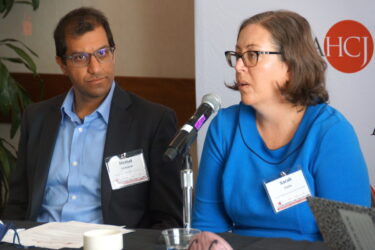
When Thomas Eric Duncan died Wednesday of Ebola at Texas Health Presbyterian Hospital in Dallas, one of many questions that remained unanswered was why the hospital didn’t do more to diagnose and treat Duncan initially. On Sept. 25, Duncan walked into the hospital’s emergency room, was given antibiotics and sent home, according to coverage in the Los Angeles Times and elsewhere.
The question about what happened on Sept. 25 is important because Duncan could have infected many other individuals between when he was sent home on Sept. 25 and when he returned on Sept. 28 and was put into isolation. Writing in The New York Times, Manny Fernandez and Dave Philipps suggest that Duncan might still be alive if he had been admitted on Sept. 25.
After his death, Duncan’s fiancée, Louise Troh, and other African-Americans, questioned whether Duncan had received substandard care.
“The Rev. Jesse Jackson and Dallas County Commissioner John Wiley Price, who is also African American, said they suspected that the hospital’s initial failure to treat Duncan as a potential Ebola victim was the result of his race and his financial situation,” the Los Angeles Times reported. Quoting Price, LA Times writers Molly Hennessy-Fiske and Tina Susman, wrote: “The real elephant in the room is, the man was black, he had no insurance, and therefore he was basically turned away.”
In The Atlantic, Olga Khazan raised the same question. Also quoting Price, she wrote, “We know why what happened at Presbyterian happened. If a person who looks like me shows up without insurance, they don’t get the same treatment.”
The federal Emergency Medical Treatment and Labor Act (EMTALA) governs emergency medical care and requires ERs to stabilize and treat anyone who arrives in the ER needing care, regardless of insurance status or ability to pay.
The act is sometimes called the “patient anti-dumping act,” because hospitals are concerned about the significant expense of providing uncompensated care and so may refuse to treat the indigent and uninsured. Writing for Bloomberg, Alex Wayne estimated that Duncan’s care cost between $18,000 and $24,000 per day.
“The burden of uncompensated care is growing, closing many emergency departments, decreasing resources for everyone and threatening the ability of emergency departments to care for all patients,” according to an ACEP news release.
The law applies to all hospitals that have dedicated emergency departments and that participate in Medicare, and it applies to all patients, regardless of their eligibility for Medicare, as the American Health Lawyers Association explains.
When a patient with a medical emergency arrives, a hospital must do an appropriate screening exam and treat and stabilize the patient, according to the American Academy of Emergency Medicine. The hospital can then transfer the patient, but only if the patient has been treated and stabilized.
In Duncan’s case, the hospital staff initially said there was a communication error in its electronic health record system, but later retracted that claim.
In his “Not Running a Hospital” blog, Paul Levy called for a full root cause analysis. “Then we need a way to send the message of what was learned throughout the country.”
For a thorough examination of all the unanswered questions in this case, see this blog entry yesterday by Jim Schutze in the Dallas Observer, a weekly alternative newspaper.









